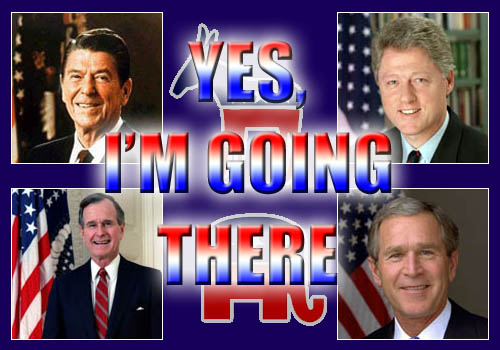- YES,
I'M GOING THERE
- December
21, 2007
-
- Over the years
I have stayed out of the political fray.
Much like
religion, politics is polarizing. Even
in a friendly environment with those who are adamant
about an issue or a candidate, political discussions
can result in tempers flaring and, very often,
friends and
relatives screaming at each other.
In the past, because I value family and friends, I
have publicly stayed away from these
conversations.
-
- This year,
however, I feel compelled to bring to these pages, my
personal observations on the important issues of our
time. It seems that as I grow older - in years only
 - feel the need to publish these thoughts, for
clarity, and for future generations of
the
Kontras
Family.
- feel the need to publish these thoughts, for
clarity, and for future generations of
the
Kontras
Family.
-
-
- Historically
Speaking
-
- Those that know
me now may find this hard to believe, but
I voted for
Ronald Reagan.
-
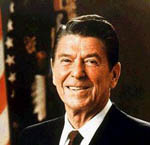 -
- I certainly did
not agree with him many issues. My reason for voting
for Reagan was that I
thought the country needed a unifying leader at the
time. On the
surface, he appealed to many on all sides of the
political spectrum. Truth-be-known, I think most of
his policies were not good for the country. One major
example: By reducing
taxes on only the highest income
earners in
our country ("Trickle-Down Economics") he created a
huge gap in income for the government that was offset
by doing such things as: reducing
budgets on a variety of critical social programs that
benefited those less fortunate in our
country,
taxing Social Security income for the first time,
de-regulating
the airline industry and the portions of the banking
industry,
reducing
funding for food inspection
programs and
educational programs, and even threatening the
individual states with reducing their government
sponsored highway improvement funds if they did not
reduce the speed limit to 55mph.
-
 -
- Even with all
of these reductions in costs, this country
continued
further into debt.
Many of these reductions adversely affected the middle
and lower income wage earners of our country. By
reducing government funding for so many state and
local programs, individual states, counties and cities
had to raise their taxes to try to keep these programs
alive. Property
taxes, sales taxes, state and local income taxes, all
drastically increased nationwide.
New fees were introduced for many services that were
previously provided by the government for those less
fortunate. These tax increases drastically
affected 80 to 90 percent of the income earners in
this country.
I remember the term "shrinking
middle class"
being used quite a bit during these years. George H.
W. Bush was dubbed "Reagan Lite" as he continued the
fiscal policies after the 1988 election. He had
promised no new taxes, but
later had to go back on that promise because the
national debt and the budget deficit were growing too
rapidly. By
the end of his term, we were in a
recession.
-
 -
- There was
improvement in the 1990s when Bill Clinton was
President. By reversing some Reagan's tax cuts, the
income to the government increased and within the
eight years of his presidency, the
middle class started thriving again, and the
government was paying its bills.
-
- Personal
Revelations
-
- During the
Reagan years, I realized how important it is to
really
examine our candidates' views on
the issues, learn to "read between the lines" when
viewing or reading their speeches, and understand the
consequences of any programs they intend to introduce
if they become President of the United States. Using
labels such
as "Liberal", "Conservative", "Republican" and
"Democrat" began to mean very little to
me. This
period also cemented some of the thoughts that I now
have about how our government should work and what it
should and should not provide for its
citizens.
-
- SOME OF THE THINGS I BELIEVE GOVERNMENT SHOULD DO:
(1)
I believe that it is government's responsibility to
keep our citizens safe, not just with National
Security and military power, but with
(2)
strictly
enforced guidelines for any type of mass
transportation and its infrastructure (which includes
roadways, waterways and "...the friendly skies...")
and (3)
for any type
of financial institutions (including insurance
companies) that work with citizens' money.
(4)
The
government should fund and oversee the quality of, any
program that helps lift up those less fortunate, those
who are physically and/or mentally challenged, and the
elderly. (5)
Quality healthcare for every citizen should be
completely funded for providers, removing the profit
incentives that have skyrocketed costs to levels that
leave so many uninsured. There can still be choice in
the healthcare system, and subsidies for those who
cannot afford quality healthcare.
All pre-existing condidtions should be covered.
The emphasis should be on early, preventative
healthcare, which has shown time and time again to
drastically reduce medical costs. (6)
Education for our children Pre-K thru 12 should be
entirely funded, with individual states using the
money as they deem necessary to maintain a quality,
well-rounded education for all of our younger
citizens. (7)
Government
should provide strict guidelines for firearms
ownership, while keeping the 2nd Amendment intact.
(8)
Food and drug laws - and guidelines - should be very
strict and strictly enforced by the government. No
exceptions.
-
- SOME OF THE THINGS
I BELIEVE GOVERNMENT SHOULD NOT DO:
(1)
Government should not legislate morality. For example:
abortion rights. This is an issue that must be decided
by each individual, not by government. The truth of
the matter is that although nearly 100% of our
population is against abortion, a great majority of
the same people also believe that it should be a
personal choice. Another example is
(2)
gay marriage. Again, this is an issue that should
never be legislated by the federal government.
Individual states are better able to work with this
issue and arrive at decisions that best suit their
residents. (3)
Government should never be involved in deciding
elections. Elections belong to the people, not the
judiciary.
-
- I've been told
that these views mean that I am, somehow, for "big
government." Nothing
could be further from the truth.
The money we've spent to date fighting an unecessary
war - over $800B - would more than pay for all of what
I suggested above. If we are going to live in both a
"free" and "lawful" society, it must
also be a well-regulated society.
In an unregulated, totally "free" society, it is easy
for some to take unfair advantage of others, for their
own personal gain. Government needs to protect
its citizens
from these types of actions. With regulations and
funding in these areas, citizens can
make decisions about healthcare, finance, education,
etc., without
fear of being "duped" in the process.
-
- In general, I
believe we
don't mind paying taxes for those things that make our
lives a little easier and safer. We
do however, want our voices heard and not quieted by
large corporations who currently appear to be helping
to create legislation that favors only them, and not
our citizens. This
country belongs to all of us, not just the the top 2%
of the
wage-earners and their businesses.
-
- If we are going
to call ourselves the "richest" and "most powerful"
country in the world, we should do everything we can
to lift up all of our citizens so that
anyone
has the opportunity
to experience the American Dream,
if they are willing work for it. A rising tide should
lift all
ships.
Lately, that has not been the case.
-
- How
I See Where We Are Now
-
- Late this year,
it became quite apparent that the Republican Party,
under the presidency of George W. Bush, is
self-destructing.
-
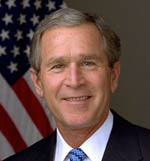 -
- The
"Bush
Doctrine" has greatly diminished our ability to be the
beacon of peace and hope
in the world. We no longer have the favor of many
nations. Domestically, the growing debt of our
government is slowly causing our dollar to weaken,
which will certainly raise the cost of everything in
this country, exponentially. There are many reasons
for the debt: The Iraq "War" is probably the single
largest reason because we are borrowing
the money from China to fund it. In
addition, major corporations are moving their
businesses to other countries, where labor is far
cheaper, which then decreases the tax revenues going
to the government, thereby causing even more
"borrowing." Companies are also out-sourcing many
services within their organizations to other
countries, again decreasing
tax revenues for our country.
Wall Street is doing "well" because by cutting their
payroll by tens of thousands of jobs and millions,
even billions of dollars, big companies decrease their
expenses which then raises their profits, attracting
more investors. This
is trickle-down economics at its worst.
It didn't
work during Ronald Reagan's tenure and it's not
working now.
-
- Can
We Really Change?
-
- Next year's
election is by far the most important in my lifetime.
I believe many people feel the same way.
We have an
opportunity to make a difference (in 2008) more than
in any previous presidential election.
To be sure,
no one
person can make all the changes that he or she
promises in a campaign.
They may have the best of intentions and plans, but
they have to work with congress to get them
implemented. They will always be faced with
resistance, regardless of how many allies they
have. Building
political coalitions that go beyond party and
ideology is
very difficult, but not impossible.
-
- Is there
someone in the current line-up of would-be presidents
that has this ability?
-
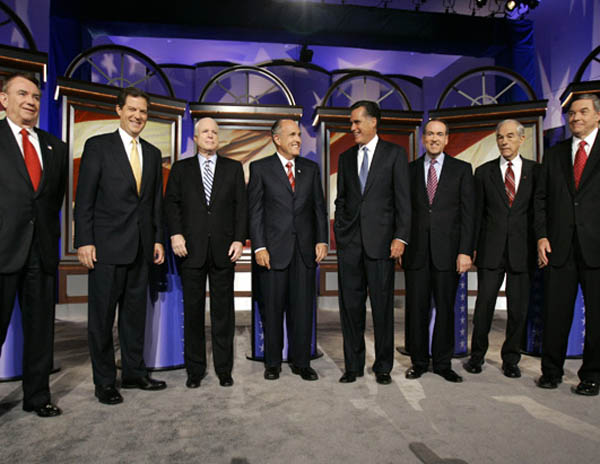 -
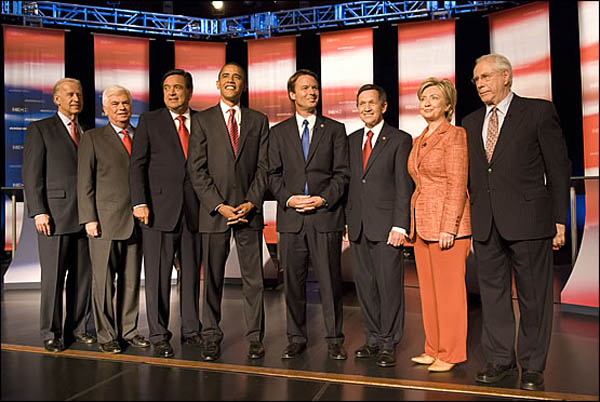 -
- I believe there
is...
-

|
